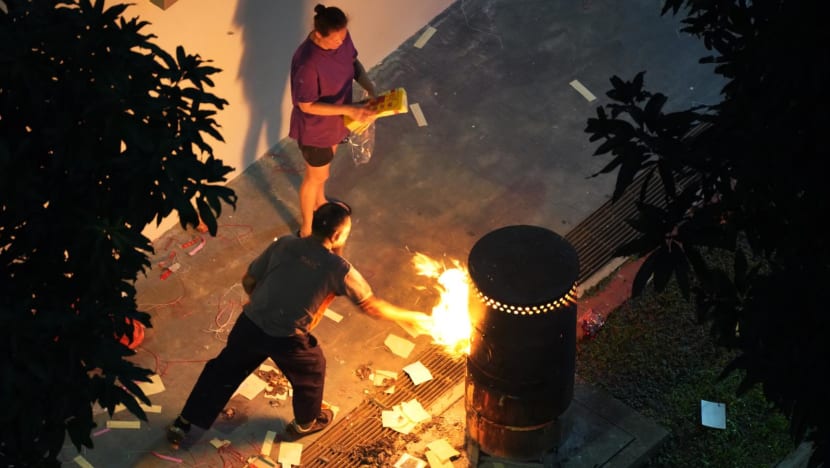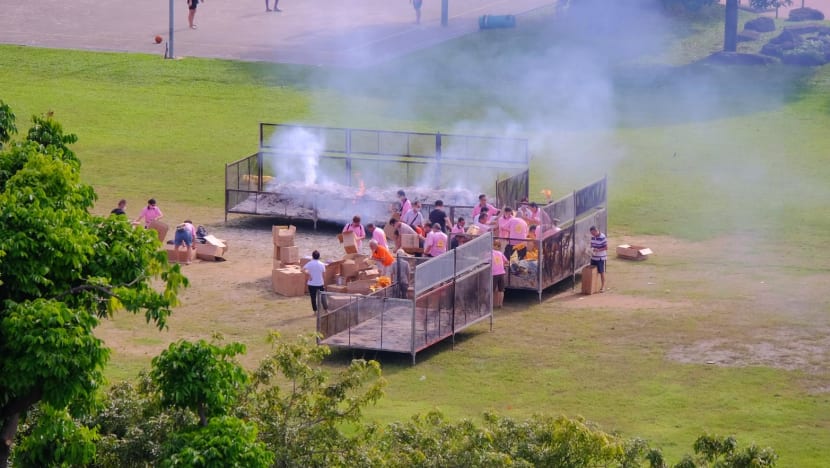Commentary: Something needs to change about our joss paper burning habits
Despite moves by various governments to limit joss paper burning, the practice continues unabated. Terence Heng asks if it is possible to find a compromise between respecting religious and cultural traditions and addressing social and environmental concerns.

File photo. A man burns joss paper during the Hungry Ghost Festival. (Photo: iStock/Kokkai Ng)

This audio is generated by an AI tool.
SINGAPORE: I do not envy the Alliance for Action on Norms for Joss Paper Burning (cleverly acronymised as AfA rather than the much more challenging AANJPB), whose mission is to “forge a consensus within the Chinese community on desired norms for the traditional custom of joss paper burning”.
Every Hungry Ghost Festival, they are faced with the very difficult and challenging task of balancing the desires of individuals to burn joss paper, with the needs of society to address air pollution, climate change and increasingly high-density housing arrangements.
This year, the AfA has released a music video mixing Hokkien and Mandarin, entitled Sincere Can Already and starring Singaporean actress and getai star Liu Ling Ling. In this video, Liu, supported by brightly dressed backing dancers, raps her way through an HDB neighbourhood, exhorting viewers that what really matters is one’s intention, not how much joss paper one burns.
The video ends with a jolt of humour. The perpetrator in the video, an old uncle burning joss paper in an HDB corridor, raises his thumbs uneasily when Liu asks him if he “gets it”. Although this was obviously done for comedic effect, I suspect this might be the immediate response one might get from viewers - a dawning realisation something needs to change, but slightly unsure if one is able or willing to effect that change.
IS BURNING AND TOSSING JOSS PAPER SIMPLY SUPERSTITIOUS?
The issue of joss paper burning is not just in Singapore. A recent news report in March noted that some local governments in China had banned the manufacture and sale of joss paper, with one spokesperson branding the act of joss paper burning “uncivilised” and rooted in “feudal superstition”.
There was also a practical element to this. Burning joss paper seemed to create issues like fires that the local authorities had to put out, but I am unsure if reducing cultural practices to acts of superstition is the best way to tackle an environmental problem.
In my research, I have encountered opinions on both sides of the debate. One side argues that joss paper burning is dismissed as an outdated superstition that has no place in modern society. The same goes for any ritual or act that disrupts the rhythm of everyday life.
On the other hand, I have found that burning joss paper reveals a mix of intentions among adherents. These include but are not limited to mnemonic rituals (or acts of remembering loved ones), protection from spiritual harm (especially during the Hungry Ghost Festival where one sees a need to satiate wandering ghosts) and “traditional” habits (having been brought up since young to do so).
In other words, the act of burning joss paper for some individuals remains central to their identity.
That said, sometimes some practices are indeed influenced or amplified by popular culture and media, such as the act of throwing unburnt joss paper in the air. Ostensibly, some adherents tell me this is to compensate spiritual beings nearby, but others also confess to doing so to achieve a certain aesthetic and dramatic effect.
NOT JUST ABOUT THE SMELL
Singapore’s approach so far is one of moderation and pragmatism. We cannot eliminate burning completely, but we cannot simply ignore the issue year after year.
To be fair, there have been fewer complaints over joss paper burning. During the Chinese New Year period this year, town councils and government agencies logged 567 complaints, down from 761 cases during the same period in 2023, marking an all-time low.
This decrease in complaints suggests progress and effective advocacy on the part of the AfA, but as Singapore’s population grows, so does our population density. More and more people are living closer and closer together, meaning that the by-products (mostly the smoke) of joss paper burning affect a greater number of households at any one point of time.
The issue is not just about smell or discomfort. Studies in air pollution show that such smoke (religious or otherwise) is a growing concern in public health. In other words, it is not just about an inconvenient smell, but also a contributing factor to the health of the living.
Furthermore, as household wealth also increases, people are correspondingly tempted to purchase more and burn more. In our consumer society, there is no shortage of companies willing to satiate demand. One simply needs to walk into a supermarket now to buy as many paper offerings and a Fort Knox worth of “gold paper” to burn.
As an aside, we may also want to ask whether the quantity we burn is a reflection of the needs of our ancestors, or peer pressure from the living to “keeping up appearances”. Are our desires to ward off ill-fortune unduly influenced by a society driven to consuming more and more each year?

WHAT TO DO?
Hard approaches, like outright bans on selling or burning joss paper, alongside reductionist terms like “superstition” will never work, and only serve to harden the position of adherents to see the act of burning as a core part of their religious and cultural identity.
Gentle prodding and education probably goes some way to nudge a few individuals to think about where and how much they burn, but to accelerate change, we probably need to think harder with empathetic design solutions.
For example, in encouraging adherents to visit temples, we might want to think if such solutions are feasible for those with mobility issues, who might consider even a short bus ride too much work to burn a few stacks of joss paper.
How can we meaningfully support such individuals - chartered transport to temples, or perhaps a collection service of joss paper to be brought to more eco-friendly burning points?
I do not think there are any easy answers (if there were, there would be no need for the AfA’s remit). But I do think there can be some compromise between spiritual desires and environmental or health concerns.
After all, doing good is for both the dead as well as the living.
Terence Heng is Senior Lecturer in Sociology at the University of Liverpool. His new co-edited book, Death and the Afterlife: Multidisciplinary Perspectives in a Global City (Routledge 2024) documents, maps and theorises Chinese death practices in Singapore.
















